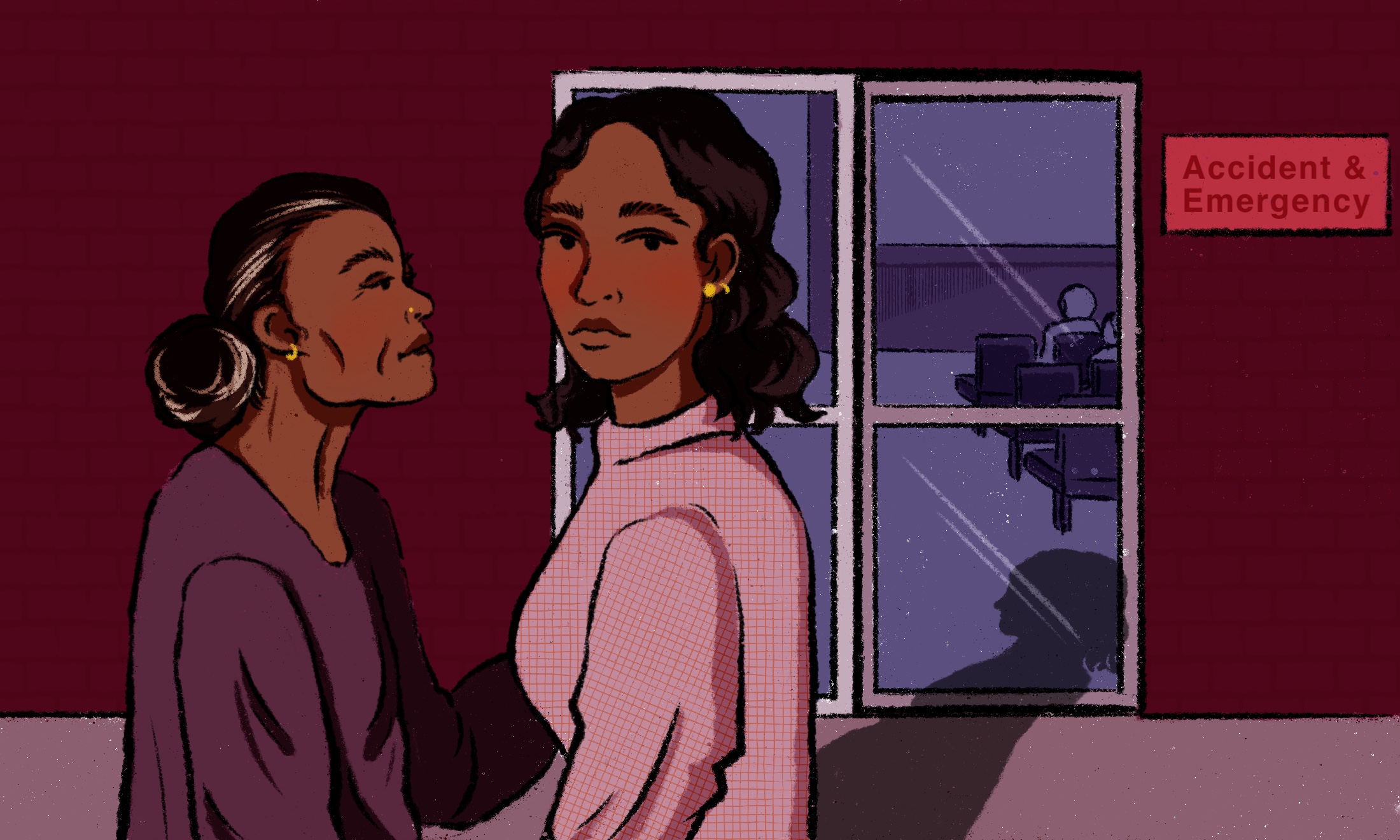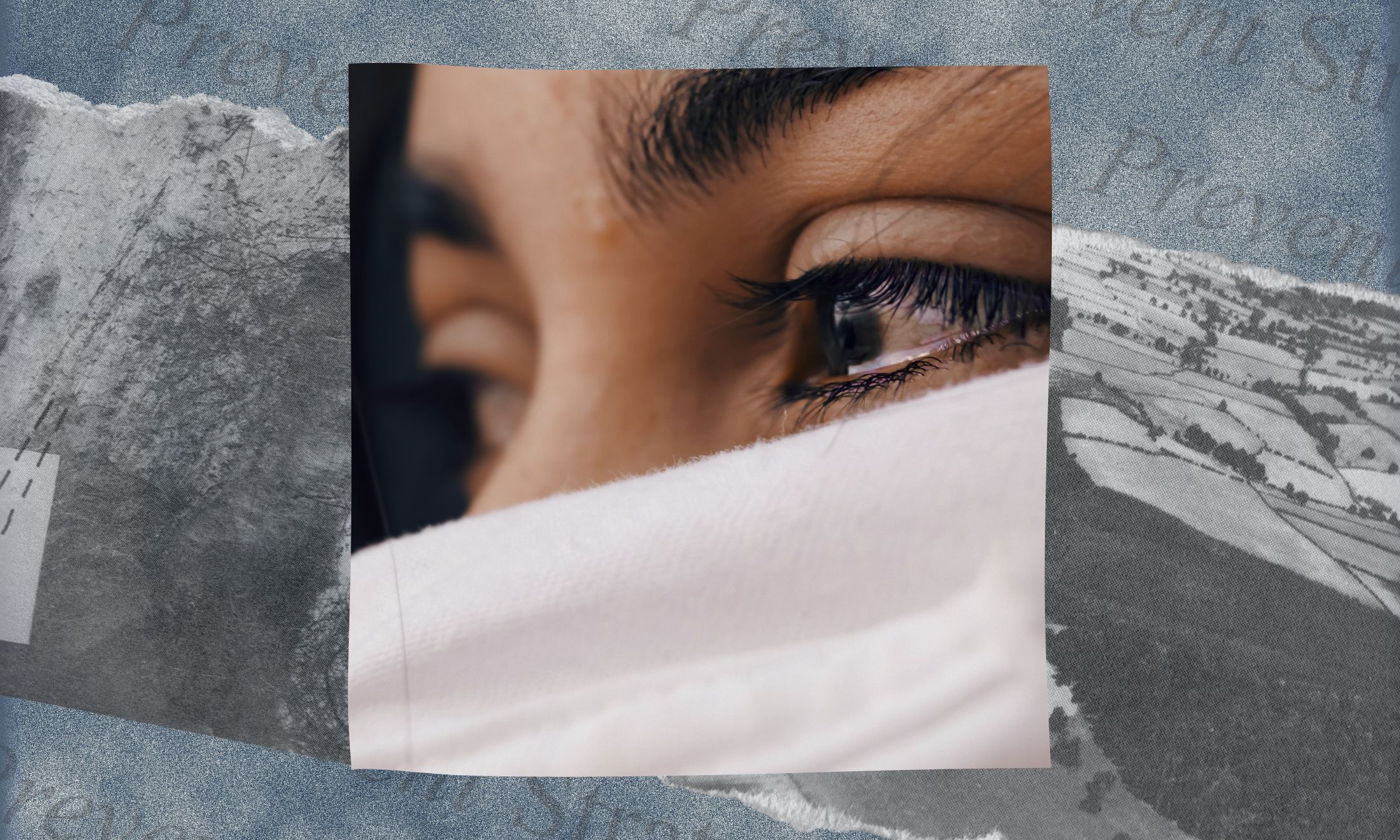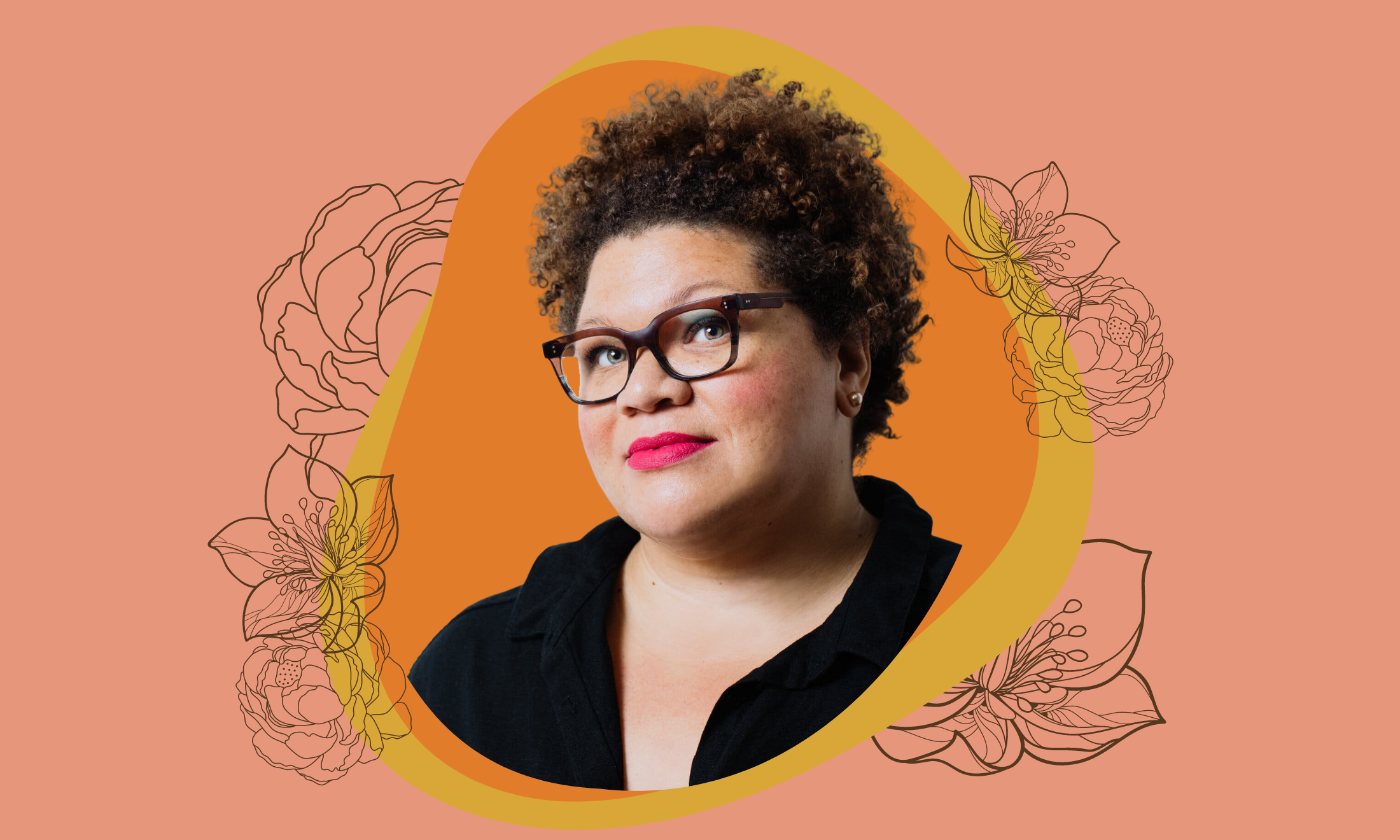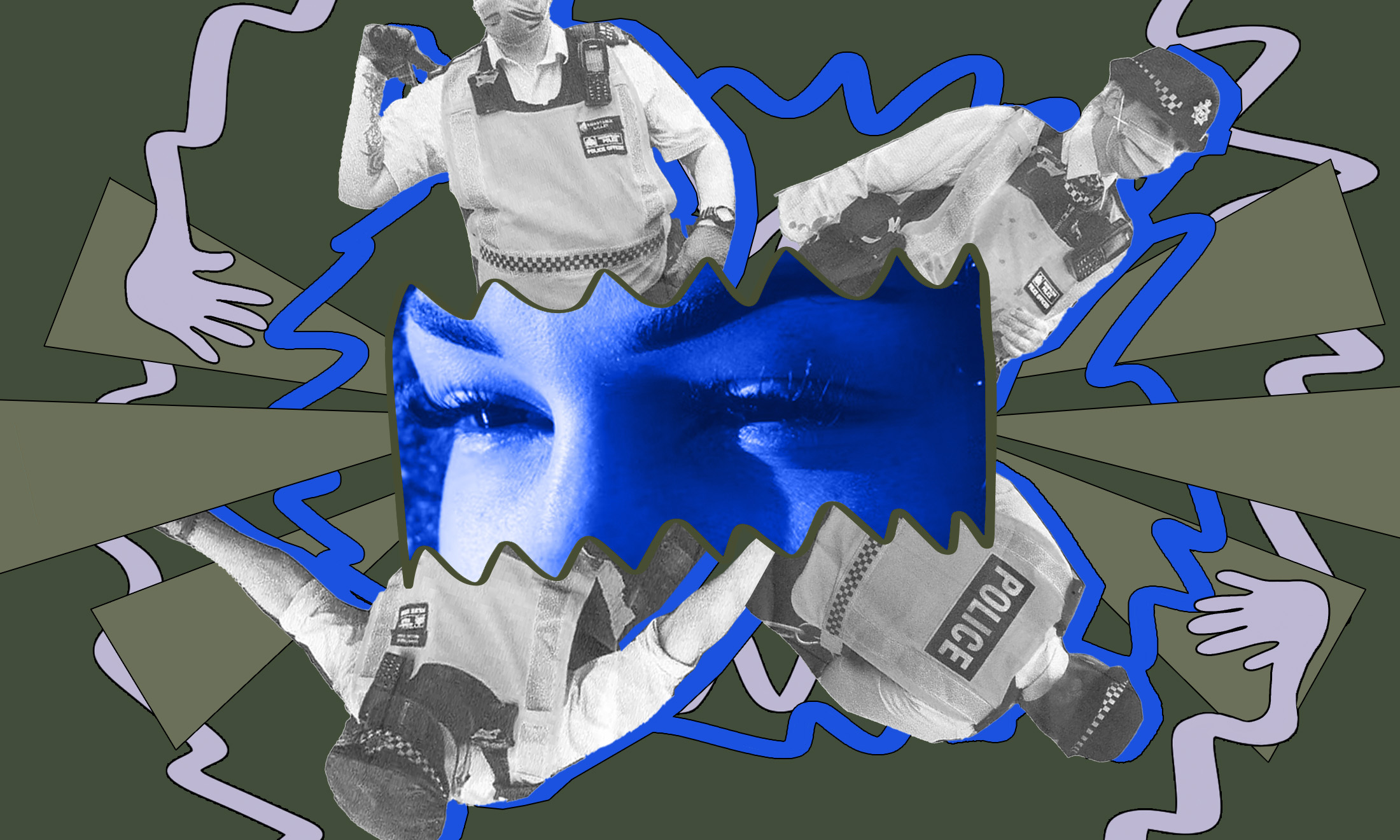
Joanna's mother Margaret when she qualified as a nurse, c.1964 / Photography courtesy of Joanna Brown
A love letter to my mother, the nurse from Sierra Leone
Essayist Joanna Brown reflects upon the loss of her mother who came to the UK in the 1960s, their deep connection and the care shown by the NHS during her final days.
Joanna Brown
14 Jun 2020
That night, you are teaching me to cook: golden roast chicken, fried plantain, steamed rice, sautéed greens, pepper sauce. You giggle and we wriggle around each other in the balmy heat of the small kitchen. I watch you chop, mix, stir. Look at your beautiful hands: fingers slender, elegant; nails smooth ovals tipped with ivory; ringed with promise, wedding, eternity. Perfectly poised, they stir thyme and lemon, nutmeg and cayenne. You conjure spiced alchemy, the steam rises and drifts, fragrancing the air with memory. I kiss your brown, freckled cheek. Soft, warm.
After dinner, you go to bed early. Being on your feet exhausts you; pain screws your joints tight. It has been four years since you left work. Four years pinned to your bed. I am 13 when it begins. You need my help in almost everything you do. Need it, but don’t want it. It’s a cruel reversal for a tiger mother. A spiteful paralysis for a woman always moving. Sang and swang whilst ironing. Danced whilst cooking. Ran for a bus no matter what the distance: legs reaching further with every stride, laughing breathlessly at the driver as you dug into your purse for the fare. Now you lean on me to move from one room to the next; gripping my arm, sucking air through your teeth with each laboured step. I lower you into the bath, lift you out of an armchair. Your bed is by turns your prison and throne. I come and go daily: shopping before school (milk, magazines), shopping after school (medicines, groceries). Locked together, we bicker, we love, we argue, we laugh, we talk, we cry, we fight. Sisters, friends, enemies: mother and daughter, daughter and mother.
Sometimes we are silent together. I climb into bed beside you and read. My thoughts are entangled in the story of someone else’s teenage drama, but I feel your breath on the back of my neck, butterfly soft.
You’ll need to look after yourself, you tell me.
I’m not going to be around forever.
You’ll thank me when I’m dead and gone.
When I’m in the ground, you’ll understand.
One day, when you’re a mother…
You love uttering these prophetic wisdoms. Sometimes they are laced with black humour, chased by cackles.
Don’t let the boys tamper with you, or I’ll come back to haunt you. Tell them I’ll come after them with scissors.
I tell myself it’s because you’re a nurse. You worked nights. It brings out the dark side.
I have just left school. A-levels under my belt, a place at University awaits next year. We don’t talk about how you will cope without me. This year, I am working as a medical receptionist at a plastic surgery clinic. You’ve pulled strings with one of your nursing friends. Every day I don a trouser suit and sit in a bright and airy room, waiting for the phone to ring. Occasionally they let me type up letters or invoices. I once accidentally walked in on a rhinoplasty. I had a phone message for one of the surgeons and went through the wrong door. Four ghosts, gowned and masked, looked up at me, eyes wide with outrage. On the table, a still body with an opened face. The flat insistent beep of a machine. A sickly smell, chemical. I backed out, apologising, and ran blindly for the loos. I made it just in time before throwing up violently. When I tell you this, you rock with laughter, wide smile flashing, hands clapping, once, twice, then held together as if in prayer, thankful for the image.
The job at the clinic is easy enough. It’s quiet. When the phone rings, it’s usually you. Boredom and solitude prompt you to break off from reading your magazines and call me, but I hear the pages flap as you flick through them while we talk. Nursing Times, Nursing Mirror, Cosmopolitan, Hello.
“Remember them, you said. You can talk to them, remember them, continue to love them. They can still hear you”
Do you remember taking me to work with you during the school holidays? It was easy when you were on children’s wards. I’d bring a bag full of books and read stories to your patients. Young children with plastic tubes taped to their noses, or sprouting from holes in their chests. Aboubakar, a chatterbox with a gap-toothed grin who had four holes in his heart. Idris, soft-eyed and sad, who loved card games, and had only one kidney. Amina could not move, but her eyes sparkled whenever she heard music. Sometimes I would peek through a half open door and silently watch you rearrange their pillows, smooth their hair back from their foreheads, hold their hands in yours. We had photos of each one. They were my imaginary siblings. I never questioned that my mother was mothering other people’s children. I understood. And the other nurses would mother me in turn when you were busy. Bring me tea, biscuits. I loved reading aloud to my hospital family. Fairy tales, nursery rhymes, nonsense poems. The words lisped and tumbled out of my mouth: the children giggled and asked for more. They went to sea in a sieve, they did. In a sieve they went to sea.
When each child died, you would place a photograph of them in an album, carefully peeling back a film sheet from a page in a little red book with cushioned covers, and gently placing the photograph to rest in the centre, before smoothing the film down again firmly with the flat of your palm. There. Every now and then, we would take the album down from the shelf, sit wedged against each other on the sofa and turn the pages together, naming the children one by one. Naeema. Irina. Idris. Abdul. Jacob. Aboubakar. Remember them, you said. You can talk to them, remember them, continue to love them. They can still hear you.
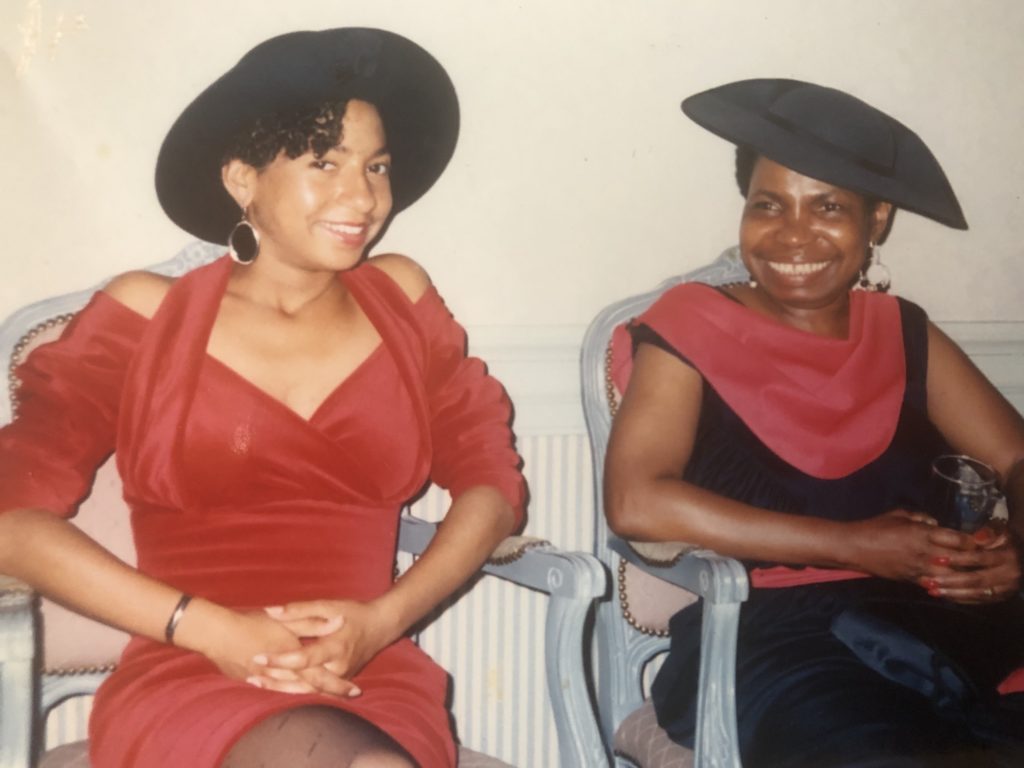
Now you also have a plastic tube sprouting: a little tap taped to the soft flesh above your breast. You have had so many blood transfusions that the veins in both arms have collapsed and the tube is the only way to get the sickled blood out and the fresh blood into your body now. All eight pints drained and replaced. A week of tough days in hospital, followed by a week of quiet days at home. It takes four weeks for the blood to sickle up again. For it to slow and thicken in your veins, coagulate around your joints in a sticky stubborn mass. Pain is your constant companion. Sometimes it rages about your body, ravenous, tearing away at you from within: other times it just sits patiently, holding your hands and looking you straight in the eyes. You stare it down, but it never leaves you.
Deep into that night, the smell of the chicken and the plantain still heavy and warm in the air infuses my dreams. Something invisible drags me to the surface of my sleep and slaps me awake. I sit up with a jolt. Your voice, somewhere far away. It comes again, crying out my name: shrill, harsh, closer. I stagger into your room, switch on the light. You are lying in bed, struggling to get up, shivering violently. The whites of your eyes are yellow and filmy: you stare into me, not seeing me. Your teeth chatter through clenched jaws. Your hands twist the sheets into thick ropes. I hear my voice cajoling, comforting. Your eyes widen. Trembling and trying not to cry, I grab the phone next to your bed and call for an ambulance. It’s a familiar drill. I want to hold you still, to stop you shaking like that, but something has you in its jaws and will not let go. I bring a mug of hot water to your mouth: your teeth clatter on its edge, water spills down your chin, you shudder in my arms.
Flashing lights on the wall. I look at my watch. 1:47am. Did you sleep while I was sleeping? I open the door to a young man and woman, serious-faced, gentle-voiced. I worry about their heavy boots on your bedroom carpet. They take control: offer reassurances, give instructions, ask questions. I stand back. They ask me to pack you a bag. Comfortable clothes, underwear, a comb, hair oil, toothbrush, perfume, magazines: then, as an afterthought, scarlet nail varnish. You asked for that last time you went in. I watch as they lift you out of bed, into the hall, downstairs to the front door.
“I want to hold you still, to stop you shaking like that, but something has you in its jaws and will not let go”
“Should I come?” I ask. They tell me no, stay home, phone in later, come tomorrow. Strapped to a metal bed you disappear into the back of the waiting ambulance. It is freezing outside. I can see my breath billow and rise in front of my face with my words: “Will she be warm enough?” When the doors close between us, I stand for a moment in the road feeling foolish, redundant as the ambulance pulls away, spinning blue light, siren screaming. Silence falls again like a cloak over the street.
When I call the hospital, a woman with a heavy, tired voice says she can give me no news yet as you’ve not been seen by the doctor and tells me to call again later. I give it another hour. The same woman says that the doctor is with you now: try again in a bit. When I call a third time, she says that you are “stable” and that I should go to bed and ring in the morning. Get some sleep, darling. Her accent reminds me of yours. Sierra Leonean? Nigerian? It’s comforting. Reluctantly I return to bed. I dream that I am standing alone under an umbrella in heavy rain, an open grave scooped out of the earth in front of me. Ice floods my chest, rousing me. I ring the hospital again. 4am, fourth call. A soft voice with a Cork lilt tells me that you are asleep now. I think I should come and see her. Now. The edge in my voice wavers between assertion and panic. The returning voice sounds weary. She needs to sleep. Call again in the morning, love. It is the morning, I want to say. I want to tell them about the dream, but I don’t.
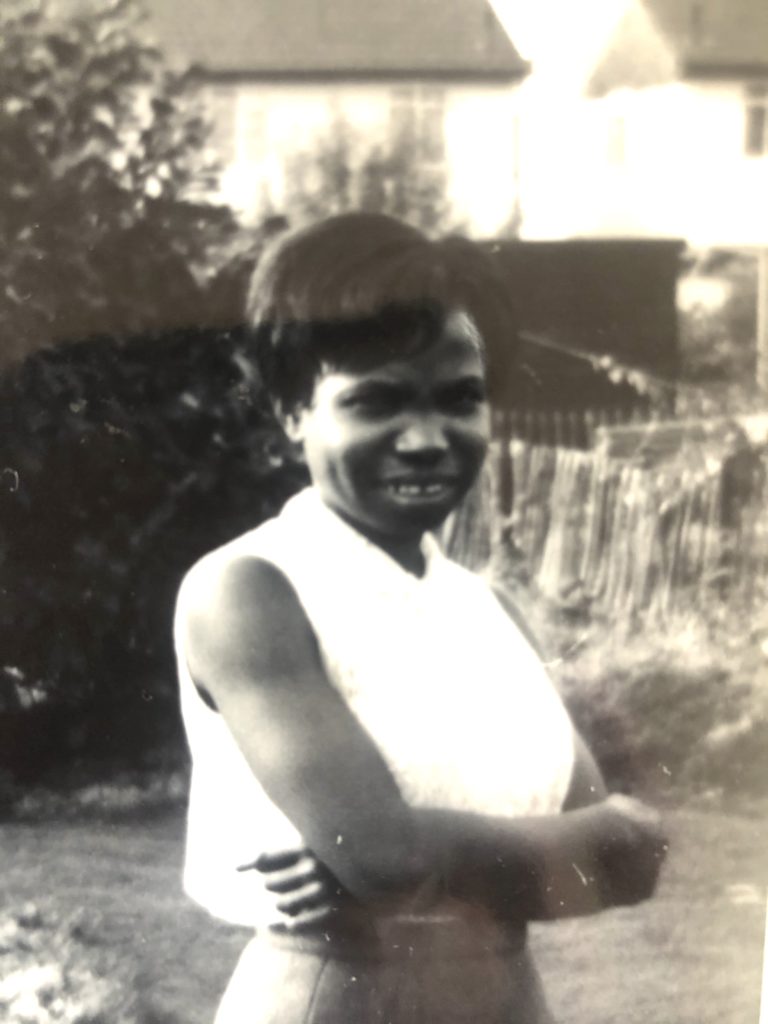
When my alarm goes off, my head is thick with confusion. I can’t remember what I’ve dreamt and what has happened. In your room, the light is still on, the bed is empty, and the sheets are crumpled and damp. On the bedside table, a half-drunk mug of water. I phone the hospital again. The woman with the West African accent reassures me. You have been seen by the doctor, you are still sleeping, you are stable (that word again) and we should let you sleep now. When can I see her? Later in the day, she tells me. They’ll run some tests when you wake up. Visiting hours are from two till eight. Can I come at two? Yes, do that. This gives me time to go to work for the morning first. That will please you. Try not to worry, the nurse says. I thank her, happy that I know I am going to see you at a prescribed time.
I make a cup of tea. Staring at the wall I think through the day ahead. I want to show you that I can manage on my own, that I can keep up the work, balance it with looking after you. I think about how much easier it will be without having to study in the evenings. I put fresh sheets on your bed, water the plants and get in the shower to wash away the residue of dread from the previous night.
“You were a devout worshipper: chatting, cajoling, chastising, charming, bantering and bartering until you triumphed”
Outside, it is a crisp cold morning. Everyone moves quickly and with purpose, bright and hard-edged in the sun’s dazzling light. When my bus arrives, I sit upstairs, at the front, as always: the view is best from here. I’m feeling calmer now. It’s been years since you and I took a bus together. You’re just not well enough anymore. We used to take trips into town. Up town, you called it. Oxford Street, shopping. When I was small, I’d hold your hand from the minute we left the house until we returned, or so it seemed. You bought perfume, watches, handbags from men who shouted from their cardboard box mountains on the street, preachers of thrift. You were a devout worshipper: chatting, cajoling, chastising, charming, bantering and bartering until you triumphed and had exactly what you wanted for just the right price.
Once, we were weaving in and out of the crowds as usual: I hurried to keep up with your determined stride as you pulled me along. I was six, I think. We were heading towards a crowd on the edge of the pavement. Men and women were standing in the road. I thought they were buying handbags. But you could see something I couldn’t. Hang on, darling, you said, and you let go of my hand. I took a deep breath as you disappeared into the crowd. People closed around you like water closing over my head. I pushed my way through the forest of legs and emerged breathless to find you kneeling next to a woman lying on her side in the road. You had your ear to her mouth. Her blonde hair was matted with blood. A few metres away, a bike, its front wheel twisted. People were muttering about a taxi. You were pulling a scarf from around your neck and making a cushion for her head. You were cutting clothes from her with your scissors. The crowd continued to jostle and push, watching, murmuring. No-one moved to help. Their muttering buzzed in my ears, irritating, menacing. You were bent low over the lying-down woman. Your lips were moving but I could not hear what you were saying. When the ambulance arrived, the crew jumped out in their boxy uniforms and black boots. They joined you on the ground next to her and started asking you questions. I wanted to be over there, with them, with you, helping. Instead, I was in a crowd of bystanders. When the crew had strapped the woman with bloodied hair to the metal bed and rolled it into the back of the waiting vehicle, they thanked you. As the crowd dispersed, your eyes found me; you smiled at me and made your way towards me. Your hands were covered in blood. I watched, blinking away tears as you took tissues out of your bag and cleaned your hands. You knelt down in front of me with your arms outstretched, mine again, and all my fear fell away like black feathers from a fairytale ending. I threw my arms around you and buried my face in your neck. Your heavy perfume filled my nose, a wave of relief. As I sobbed into the sweet warmth of you, pride rose like a lump in my throat, threatening to choke me.
Extract from Birds can be heard singing through open windows which was highly commended in Spread the Word’s Life Writing Prize 2020. The full version can be read in the Life Writing Prize Anthology

